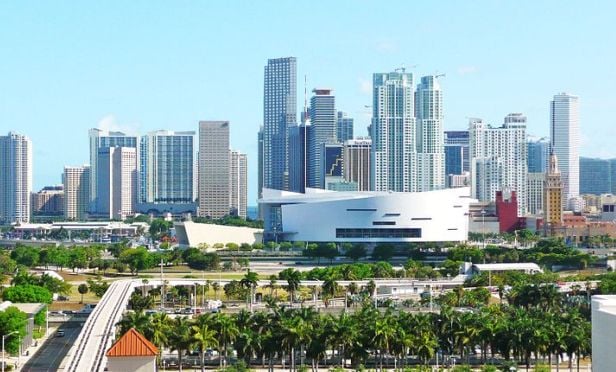MIAMI—The demand for Miami real estate is rising—at least among investors in China. What is driving the press?
There are a handful of factors. According to a study from Investorist and WalletHub. The top five investment motivators are education, money migration, asset safety, lifestyle and budget.
Chinese interest in US real estate has skyrocketed from $600 million in 2009 to $33 billion in 2016. Miami ranks as the second most popular US city for Chinese investors, many of whom are drawn to the city namely for its status as a financial hub, rising land values, the newly proposed Chinatown, and elite education opportunities such as University of Miami.
“Education is extremely important in the Chinese culture,” Investorist vice president Josh Cunningham tells GlobeSt.com. “In their eyes, it's the number one key to success. Having the ability to send their children to the best schools that enable them to excel in the real world is absolutely indispensable.”
(What sets Chinese Millennial real estate buyers apart? Find out.)
University of Miami ranked 53rd out of 1,184 total colleges and universities for providing a quality educational experience to international students. Sweet spot pricing for Chinese investors tends to learn towards condominiums in Miami priced from $300,000 to $700,000—not necessarily “high-end luxury” as most developers think.
“Obviously, everyone wants their children to have the best education possible, but for Chinese there's a strong desire for their children to experience a western education beyond the borders of China,” Cunningham says. “Because China is a communist country, their education is highly limited to what's dictated by the government, so naturally any opportunities to be educated about the world and not just about China, are most desirable.”
Is there a flu spreading in the retail industry? And if so, what part does China play? Get one insight.
MIAMI—The demand for Miami real estate is rising—at least among investors in China. What is driving the press?
There are a handful of factors. According to a study from Investorist and WalletHub. The top five investment motivators are education, money migration, asset safety, lifestyle and budget.
Chinese interest in US real estate has skyrocketed from $600 million in 2009 to $33 billion in 2016. Miami ranks as the second most popular US city for Chinese investors, many of whom are drawn to the city namely for its status as a financial hub, rising land values, the newly proposed Chinatown, and elite education opportunities such as
“Education is extremely important in the Chinese culture,” Investorist vice president Josh Cunningham tells GlobeSt.com. “In their eyes, it's the number one key to success. Having the ability to send their children to the best schools that enable them to excel in the real world is absolutely indispensable.”
(What sets Chinese Millennial real estate buyers apart? Find out.)
“Obviously, everyone wants their children to have the best education possible, but for Chinese there's a strong desire for their children to experience a western education beyond the borders of China,” Cunningham says. “Because China is a communist country, their education is highly limited to what's dictated by the government, so naturally any opportunities to be educated about the world and not just about China, are most desirable.”
Is there a flu spreading in the retail industry? And if so, what part does China play? Get one insight.
Want to continue reading?
Become a Free ALM Digital Reader.
Once you are an ALM Digital Member, you’ll receive:
- Breaking commercial real estate news and analysis, on-site and via our newsletters and custom alerts
- Educational webcasts, white papers, and ebooks from industry thought leaders
- Critical coverage of the property casualty insurance and financial advisory markets on our other ALM sites, PropertyCasualty360 and ThinkAdvisor
Already have an account? Sign In Now
*May exclude premium content© 2024 ALM Global, LLC, All Rights Reserved. Request academic re-use from www.copyright.com. All other uses, submit a request to [email protected]. For more information visit Asset & Logo Licensing.









